Main Body
Chapter 22
IN JULY 11, 1935, the headline in The Cleveland Press read: “The Press Urges Frank J. Lausche to Answer the Call of the City of Cleveland in Its Hour of Need.” City politics were in a mess. A clean, able, hard-hitting young man was needed as Mayor, and Lausche was, we were convinced, the man. His four-year term on the Municipal Bench had two more years to go. The Mayor’s election was a few months away. The editorial occupied the whole upper half of Page One. In big black type, it said, in part:
Frank Lausche is The Cleveland Press’s choice for Mayor of Cleveland. We urge him to be a candidate.
He is now a Judge on the Municipal Court, where he has proved himself fearless, honest, humane and gifted with a fine intelligence. He is young, and has all the vigor and enthusiasm of youth. He is a man of the people, born in Cleveland, raised inCleveland.
He knows all the problems of the common people at first hand. He is a man of social vision. He is a man who can be counted on to look at every public question from the standpoint of how it affects the welfare and security of the masses of the people.
He has never been afraid to challenge the organization when he thought it was wrong. He has never hesitated to criticize the organization leaders. He has flatly refused to do what he thought was improper. As a candidate for Mayor, he could seek the office as an independent, as a citizen seeking the support of all citizens who want good government.
Into a city torn by lawlessness and violence, ridden with graft and spoils-politics, infested with racketeers and plug-uglies, uncertain about its civic policies, needing a clean and honest and able leader.
Into these circumstances there would step this 40-year-old man, in the full bloom of vigorous and intelligent manhood, as the hope of this community when it most needs hope and help. This is the kind of man Frank Lausche is, and The Press urges him to answer the call of the city in its hour of need.
I had first seen Frank Lausche in action about a decade before, in September of 1928, to be exact, when I decided to drop in on a meeting at the Slovenian National Hall on St. Clair Avenue.
The man at the door stopped me.
“Where do you live?” he asked.
I was surprised at the question, and tried to avoid answering it.
“This is a neighborhood meeting,” he explained. “We want only people who live here.”
The small hall was already packed. I was intentionally late getting there, because I wanted simply to slip into the meeting unnoticed. The meeting itself didn’t interest me, but the man who was expected to speak did. I finally talked my way past the man at the door, and found a place standing up among a lot of other people who had apparently, like myself, arrived late.
My interest in this man had been stirred by several friends in Cleveland politics. One said, “Sometime you ought to take a look at this young Lausche fellow in action. He looks good.”
At that time I had been Editor of The Press only a few months. I was then thirty-one, and the tall, athletic, handsome man on the platform didn’t appear to be much, if any, older. He was, as I later discovered, thirty-three.
The meeting centered completely around him. He was urging the people to band together to protect their neighborhood, which was not far from the downtown district, from the adverse changes which were taking place in similar areas. He spoke eloquently, impatiently brushing back the thatch of curly black hair that kept getting in his eyes.
The crowd cheered him repeatedly, as he talked alternately in English and Slovenian, and the neighborhood organization he proposed was enthusiastically accepted.
I waited until the meeting ended. Threading my way through the jostling crowd, I finally reached him.
“I came out here especially to see you on your own ball diamond,” I said, as I told him who I was.
He laughed. “They tell me you’ve made yourself quite a figure out here,” I went on.
I arranged to meet him at my office a few days later, and as we talked, my favorable impression of him was reinforced. He expressed himself in a straightforward way on some of the important current issues around town; and I too became convinced — as others had suggested to me earlier — that he was a good man to watch.
The Lausche family had come from Yugoslavia, his parents having been born there. Frank himself was born in Cleveland, and grew up in the neighborhood where for the first time I met him. He went to the public schools in that section of town. He played sandlot baseball in Cleveland, and worked as a lamplighter, in his father’s small print shop, and at whatever else he could to earn money. Before he was eighteen he was playing amateur baseball with one of the city’s outstanding teams, and had been given tryouts with semipro teams in Lawrence, Massachusetts, and Duluth, Minnesota.
He enlisted in the Army in World War I and was sent to Camp Gordon, Georgia, where he was given a chance to go to Officers Training School and, also, to play second base on the Camp Gordon team.
When Frank got home from the Army, he decided he wanted to study law. First he had to complete his high school work, which he did at the old Central Institute, and then he enrolled in night law school. In 1920, he was admitted to the Bar. He got a chance to practice in the law office of Cyrus Locher, who was at the time one of Governor Vic Donahey’s associates. It was this association with Locher, and his own background in the Slovenian ward of Cleveland, that drew him into the Democratic Party.
THE LAUSCHE STORY
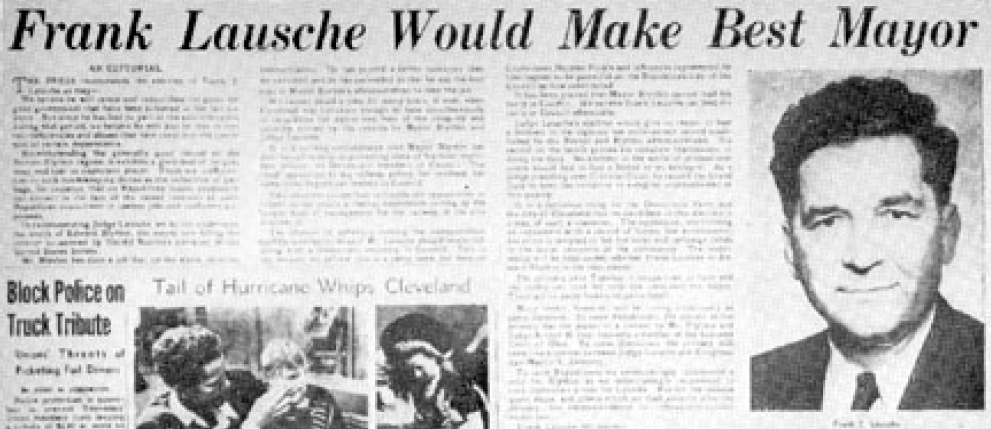
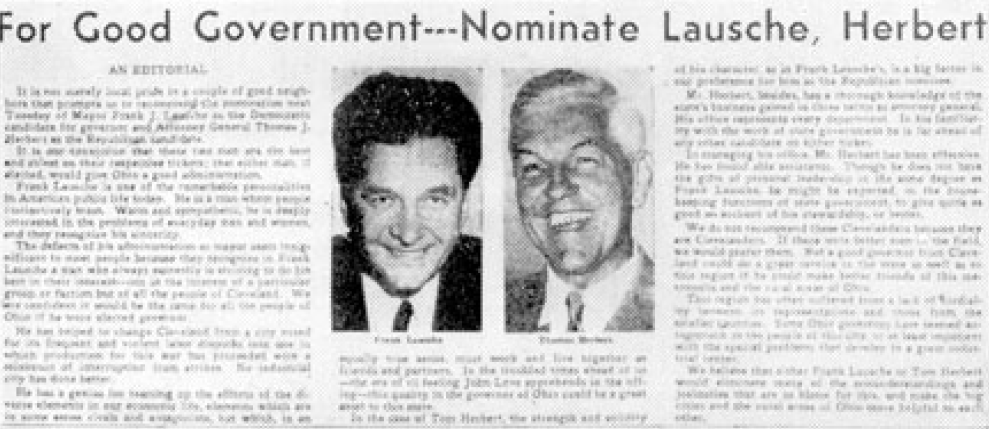
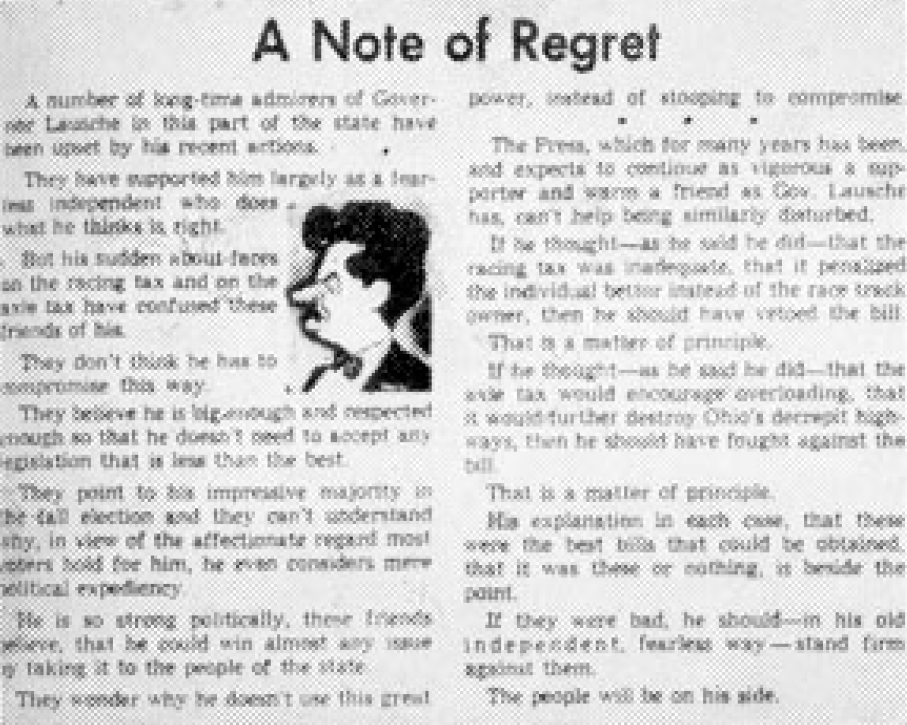
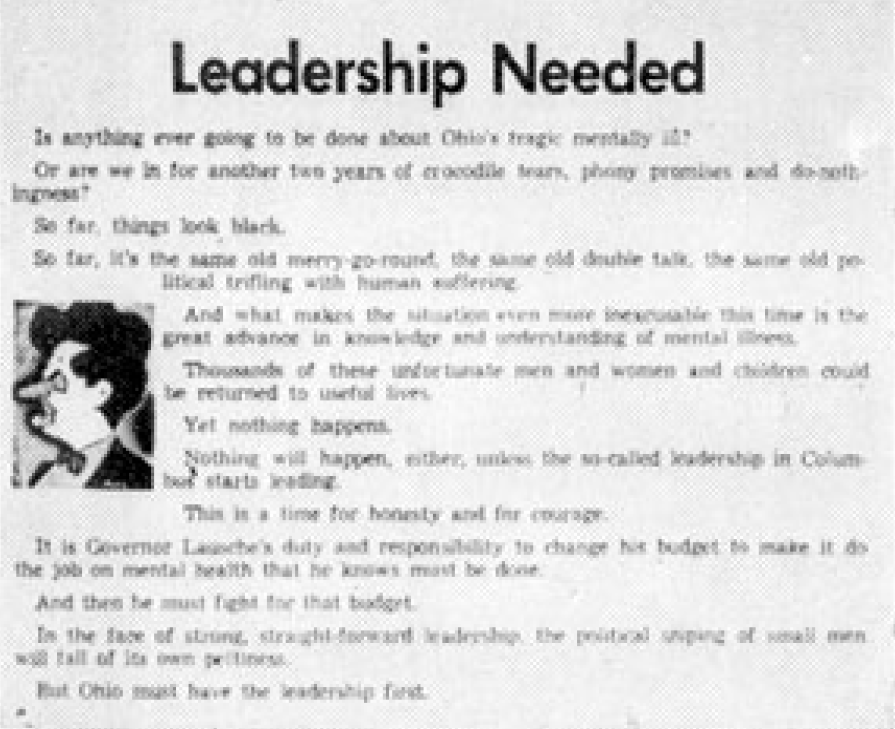
Louis B. Seltzer backs him, but not blindly
THE CELEBREZZE STORY

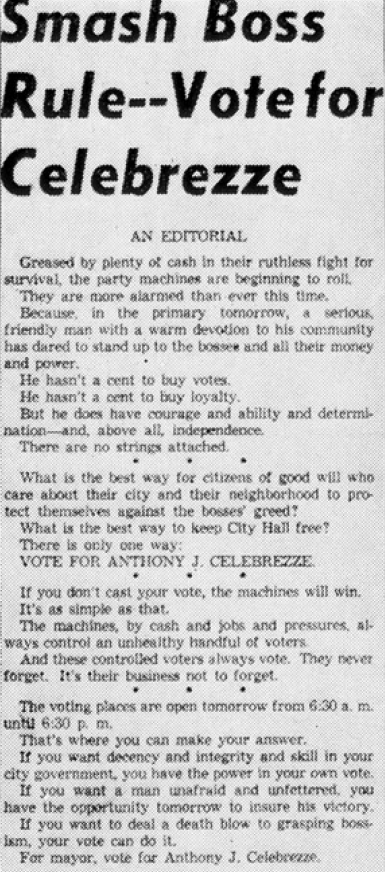
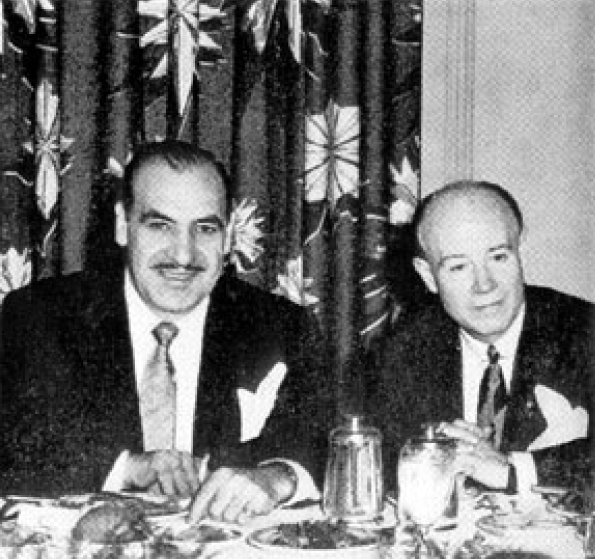
Before he finished his law course, Lausche became interested in ward politics, and he was successful from the very start. He was not quite as successful, however, when he first tried for public office in his own behalf on a community-wide basis. His first two attempts to get himself elected to the Legislature ended in dismal failure. It wasn’t long after his second attempt that I had gone out to the Slovenian National Hall to take a look at this young fellow who was supposed to be so promising.
We got to know each other fairly well during the next few years. In 1931, Lausche’s first good political break came. The Republicans had held local power securely for a long time, but the tide was then turning for the Democrats.
The Cleveland Press had been impressed with Ray T. Miller, a fiery young county prosecutor who had ably handled some tough cases, and in an editorial on Page One The Press declared for Miller for Mayor.
Adam Damm, a fat, jolly, popular man, was ward leader in Ward 23. (The city had just abandoned the proportional representation system and returned to the mayor-ward Council plan.) Damm broke with Miller to support one of his opponents, and Miller invited Lausche to take over direction of his campaign in Ward 23 — the Slovenian home ward of the young lawyer.
Lausche was tremendously successful. The ward gave Miller a big vote in the primary and an even bigger one at the election. This was Lausche’s first substantial political triumph. He was offered the post of Utilities Director in Miller’s Cabinet. When Lausche told me about the offer, I asked him, “What do you want to do? Where do you want to go in politics?”
“I would like to be a judge,” Lausche said.
He declined Miller’s offer.
Late in 1932 Miller induced Governor George White to appoint Frank Lausche to the Municipal Court Bench over John L. Mihelich, who was the Democratic boss’ personal choice. Miller proposed Lausche on the theory that he could win the election to the unfilled term, which was coming up shortly thereafter, whereas Mihelich could not. He was right.
Lausche received a vote for the Municipal Court Judgeship that startled some of the veteran politicians. His vote-getting ability was to startle them even more in the years to come. It put Frank J. Lausche on a spectacular climb to the Governor’s Office.
The young Judge quickly asserted his independence of the political bosses. I learned of one incident after another which revealed his basic integrity. On one occasion, when he would not yield to the demands of an influential politician, reprisal was threatened, but he refused to budge.
Another incident was reported to me by one of the creditors of a small neighborhood bank in which Lausche and some of his friends and relatives were interested. The bank found itself in trouble as a result of the depression, and for almost four years Frank Lausche used more than half of his Judge’s pay to help pay off the bank debts. This meant a real sacrifice for his family, and their home during this period was a small and modest one. That Frank Lausche was not in a strictly legal sense liable for these bank debts made his action the more impressive.
Lausche told me in confidence at about this same time of an incident which shaped his attitude toward politics, in much the same direction that my experiences at the old Police Court had shaped mine. He had been invited over to the office of W. Burr Gongwer, the Democratic political boss, to talk about organizational realignments in that section of Cleveland with which Lausche was most familiar.
The telephone on Gongwer’s desk rang. The Democratic boss answered, and it was evident that what he heard irritated him.
“I’ll see to that right away, and I’ll call you back,” Gongwer said. He told his secretary to put in a call for the city’s Safety Director.
“I thought you promised me that Smith’s place would not be bothered by the police,” Gongwer said.
“The police are out there right now. This fellow is important to us. He contributed $6,000 to our campaign. I wish you’d get those cops away as soon as you can.” Then he reported back to the gambling proprietor, “It’s all okeh.”
Lausche had not, up to that time, had an opportunity to look in on the higher echelon operations of the political machine. He had worked in Ward 23. He had extended his activity to a large part of the East Side, and had become a fairly substantial leader on the secondary level in organizational politics. Now he had an example of the machine’s reciprocal relationships with those who contributed to the organization’s treasury. He didn’t like it. He determined either to break away from boss-controlled politics or get out of politics altogether.
When The Press first urged Lausche to run for Mayor, in 1935, he decided against it — largely, I believe, for personal reasons. He kept his seat on the Bench. Not long thereafter he again electrified the community by conducting a one-man crusade against gamblers and racketeers who were then corrupting public officials and reaching, in some instances, into our courts.
As the Presiding Judge of Criminal Court, Frank Lausche moved against the most notorious gambling joint in the town, the so-called Harvard Club. He used Assistant County Prosecutors Frank Celebrezze and Anthony J. Rutkowski to carry out his orders. He induced Police Inspector Michael Blackwell to make the raids — and he put the Harvard Club completely out of business in spite of the “home rule” policies of the Sheriff, who declined to interfere with the local authorities of the small village in which the club was located — authorities whom the racketeers were known to control.
When the next election came up, in 1941, Frank J. Lausche was a “natural” for Mayor. The Press again took the upper half of its first page calling upon him to run.
He now decided to abandon his judicial career and make the race for Mayor. He won easily, although by this time — because of his independence of the bosses, his open defiance of them on many occasions, and his fight against the gambling racketeers — the weight of many of the organization’s leaders was thrown against him.
Lausche had not been in the Mayor’s chair more than a few days when he openly broke with Ray T. Miller, once the hard-hitting Prosecutor and Mayor, who had now become the Democratic boss. The break came over the appointment of the Safety Director, who runs the Police and Fire Department, an important political post. An honest young man named Eliot Ness had been in the post. It was Lausche’s aim to retain him. Miller wanted him out.
Lausche refused to remove Ness, and, instead, directed him to clean out every gambling and racketeering place he could locate. Miller never got over it. Through the years the breach between Miller and Lausche has widened, and they are bitter political enemies. Miller has tried to cut Lausche down at every opportunity; he even ran against him for Governor, lining up all the Democratic bosses behind himself for that purpose. But he has never succeeded.
My personal affection and respect for Frank Lausche have increased with the years. His decisions are made regardless of pressures or influences. Many politicians claim they do this, but Lausche actually does it. When he saw politics at work on the lowest and highest levels, he didn’t like what he saw, and he has become a kind of political paradox. Most popular political figures are surrounded by a retinue of political characters. Lausche has none. He wants it that way. He likes people, but he wants to be out in public surrounded by them; he abhors being in small and crowded places with those who have axes to grind.
It is clearly understood between us that he is a public figure and I am a newspaper editor; we as a newspaper never hesitated to criticize his actions during the two terms he served as Mayor. He is by nature a suspicious man, but when we were together he relaxed. He knew I wanted nothing from him, and I felt the same way about him.
Lausche attracted state-wide attention by the way he handled his job as Mayor of Cleveland but when it was suggested that he run for Governor, wise politicians scoffed at the idea. The State’s conservative political tradition, they thought, would never tolerate for its Governor the son of immigrant Slavs and a Catholic. His close advisers urged against it.
We were together one night, Frank and his wife Jane, Marion and myself.
“What do I do about this Governorship?” he asked. “Remember the time when the Utilities Directorship had been offered to you?” I asked.
He recalled it.
“I asked you on that occasion two questions, and I am going to repeat them,” I said. “The questions were: What do you want to do? Where do you want to go?” “But they say that the State’s tradition is all against me,” he said.
“Do you really think that should stop you?” I asked. “No,” Lausche said, “I want to be Governor. I would like to demonstrate, too, that this is really a democracy — that it can be done.”
He ran, with every organization leader in the State opposing him. He had no organization of his own. It was necessary to create one from among a few independent people in the eighty-eight counties. His opponents tried to attack him, all over the State, as an “alien” and a Catholic. Groups he had opposed, while Mayor of Cleveland, joined the opposition.
“It’s awful rough, Louie,” he said in the middle of the campaign. “Awful rough. What they’re saying cuts right down into you.”
I had learned, as anyone who knows Frank Lausche well has learned, that he has “lost” all his campaigns before election, only to win them on election day. The more discouraged he gets the harder he fights. In this campaign — his first on a state-wide basis — he was discouraged and disillusioned, with no hope of victory. He won by a big vote. This first campaign for the Governorship set the pattern for all others to follow. The bosses, the groups, the blocs were all always against him, but he kept winning, nevertheless.
In 1950, Lausche was faced with a unique question. He admired Senator Robert A. Taft, the man known as “Mr. Republican,” who was up for reelection with State Auditor Joe Ferguson running against him. Organized labor threw its might against Taft, and it was a bitter struggle. Lausche as the Democratic Governor of Ohio had to make up his mind either what to do –or what not to do. He declined to support Ferguson, or to say anything against Taft. This was political heresy, but Lausche stood by his position.
In a small Ohio college town he and Taft sat on the same platform at a commencement. Lausche said some complimentary things about Senator Taft — right squarely in the middle of the campaign — and his remarks raised a storm of protest among Democrats. He refused to retract or modify them in any respect. Taft won by a large margin over Ferguson.
On election day, The Press photographer took a picture of Governor Lausche casting his ballot. The angle at which the picture was taken plainly showed the ballot the Governor was marking, and plainly showed an “X” marked for Senator Taft.
From a newspaper point of view this was a great picture — the picture of Ohio’s Democratic Governor voting for “Mr. Republican.” It would make Page One in any paper, and it would be sent out by picture services to newspapers all over the country. After some debate in The Press office the picture was shown to me.
The decision was made that The Press had no right to publish the picture, newsworthy as it might be, because it represented a direct invasion of the privacy of an individual — whether a governor or a plain citizen — and of his right to cast his vote in absolute secrecy.
On a “Meet The Press” show Governor Lausche was asked the question: “Did you vote for Senator Taft in the 1950 election?”
He answered that he would be uttering an untruth if he said that he did not. That answer was no surprise to the staff of The Press, but prior to the Governor’s own admission, we had not revealed the information accidentally recorded by the camera.
When Senator Taft died in office, Governor Lausche had to appoint a successor for the unfilled part of Taft’s term. He had wanted to be a United States Senator, and he was urged to resign the Governorship after making a deal with the Lieutenant Governor to appoint him to Taft’s place.
“If I were to do a thing like that,” he told me, “the people would never forgive me, and they would be right. It’s dishonest. If I become a Senator, it will only be by election.”
He then invited me to accept appointment to the Taft place. I declined, for my life is dedicated to journalism. I quoted to him a statement attributed to Colonel Henry Watterson, the famous Kentucky editor, made under a similar circumstance: “A journalist who a politician would be, never again a journalist can be.”
Not long thereafter, he appointed the former Mayor of Cleveland, Thomas A. Burke, who had been Lausche’s Director of Law while the Governor had been serving as Cleveland’s Mayor. By a very slim margin Congressman George H. Bender defeated Burke’s effort to get himself elected to Taft’s seat.
Lausche was now serving his fifth term as Governor. He felt, as he expressed himself on the “Meet The Press” television show, in the spring of 1956, that he had no right to ask the people to put him in the Governor’s seat a sixth time. He became a candidate for the seat formerly held by his Republican friend and mutual admirer, Senator Bob Taft.
The issue between Bender and Lausche in this campaign centers very largely around what kind of a Democrat Lausche is. The answer is that he isn’t a very good Democrat when the capital “D” is used. He is a good democrat with the lower case “d.”
“Of course, I believe in the two-party system,” Frank Lausche said one evening while we were at dinner. “I believe it is essential to our democracy. That, however, does not mean that I must blindly follow either people or policies I do not believe. It does not require me to take my thinking from political bosses who are in politics for profit, instead of patriotism. If I were ever elected to the United States Senate, I would cross the aisle from one party to the other whenever the interests of the country seemed to require or justify it –regardless.”
The Press has campaigned for Lausche each time he has run for Governor. It would like to see
him in the United States Senate. That, however, as we understood many years ago when The Press first urged him to run for Mayor of Cleveland, has nothing whatever to do with our complete freedom to oppose him on any issue where we think he is wrong. He was a good Mayor of Cleveland. He is a good Governor of Ohio.
He is, however, not a very good pool player. Whenever I get to Columbus on business we try to get together for a game or two of pool. The Governor’s Mansion is staffed by trusties from the Ohio State Penitentiary — men who in the Warden’s opinion have earned a chance to redeem themselves. They are the spectators and they always bet on the Governor.
The game is played as Lausche plays the game of politics — to win. There is something in his nature that, in a contest of any kind, golf, pool, or politics, brings out his determination. He fights vigorously and with intense concentration, but he fights according to rules. When it is over, win or lose, he is gay, relaxed, and funny. It seems almost essential to the Lausche alchemy to be engrossed in some kind of contest, some fight, some challenge.
For the thirty-three-year-old ward leader from the Slovenian National Hall on St. Clair Avenue to become twice Mayor of Cleveland, five times Governor of Ohio, and a national figure in American politics is a triumph for democracy. It is also a triumph for a man who has the capacity for growth — a man who has never stood still in his lifetime, and probably never will. Frank Lausche is a restive, restless, moody, temperamental, fighting, courageous man with the gift of transmitting to other people what he is inside himself. People like and trust him.
He will leave public office a poor man. Jane Lausche has to take care of his money. He won’t. She also has to make sure that he looks halfway presentable. He isn’t interested in how he looks. Baggy pants, ruffled collar, dirty glasses, rumpled hair neither interest nor bother him. Life is centered for Frank Lausche almost wholly in the mind and spirit. The main passion of his public life is the America to which his parents came. He does not want to let it down, and I don’t think he ever will.
